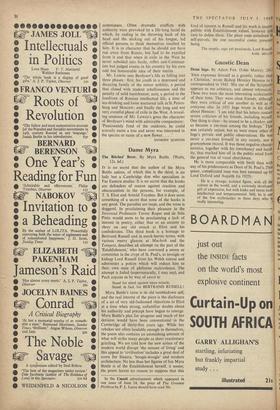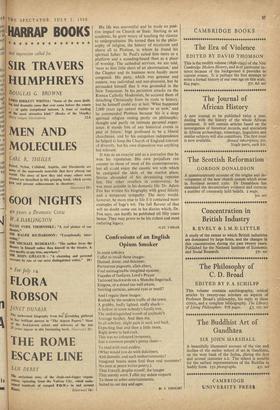Gnostic Dean
Oa!
Dean Inge. By Adam Fox. (John Murray, 28s.) 'INGE expresses himself as a gnostic, rather than a Christian,' wrote Bishop Hensley Henson to a correspondent in 1943. 'His use of the Scriptures appears to me arbitrary, and almost whimsical.
These two were the most interesting ecclesiastics of their time. They were close friends. although they were critical of one another as well as of everyone else. In 1951 Inge wrote in his diary about Henson: 'I am told that his letters contain severe criticism of his friends, including myself. One thing is clear—he ceased to be a thinker, and so became a yes-man among the bishops.' That was certainly unjust, but so were many other of Inge's private and public observations. He was
never a yes-man himself in any society, nor gramophone record. It was those negative charac- teristics, together with his trenchancy and lucid- ity, that marked him off in the public mind from the general run of vocal churchmen.
He is more comparable with Swift than with any of his predecessors as Dean of St. Paul's. This queer, complicated man was best summed up by Lord Oxford and Asquith (in 1925):
He is a strange, isolated figure, with all th4 culture in the world, and a curiously developed gift of expression, but with kinks and twists both intellectual and temperamental. Still, he is one of the few ecclesiastics in these days who ii really interesting.
His life was uneventful and he made no posi- tive impact on Church or State. Starting as an academic, he grew weary of teaching the classics to undergraduates. He turned then to the philo- sophy of religion, the history of mysticism and above all to Plotinus, in whom he found his spiritual father. St. Paul's suited him more as a platform and a sounding-board than as a place of worship. The cathedral services, we are told, 'were to him little short of an abomination,' and the Chapter and its business were hardly more congenial. His piety, which was genuine and austere, was individual and neo-platonist, but he persuaded himself that it was grounded in the New Testament. In his persistent attacks on the Roman Catholic Modernists, he accused them of detaching Christianity from its roots in history, but he himself could say at last, 'What happened 2,000 years ago cannot matter to us now,' and he commended Plotinus because 'his is a deep spiritual religion resting partly on philosophic thought and partly on intimate personal exper- ience. It stands free of any historical events in past or future.' Inge professed to be a liberal churchman, and by his outspoken independence he helped to keep the Church of England tolerant of diversity, but his own disposition was anything but tolerant.
It was as an essayist and as a journalist that he won his reputation. His own prejudices ran counter to those of most of his contemporaries, but all could enjoy the caustic wit with which he castigated the idols of the market place. Stories abounded of his devastating repartee but, like other revellers in controversy, he was most amiable in his domestic life. Dr. Adam Fox has written his biography with great felicity and a temperate sympathy. The story would, however, be more true to life if it contained more examples of Inge's wit. The full flavour of that will no doubt come out in his diaries which, Dr. Fox says, can hardly be published till fifty years hence. They may prove to be his richest and most enduring legacy.
ALEC VIDLER



























































 Previous page
Previous page